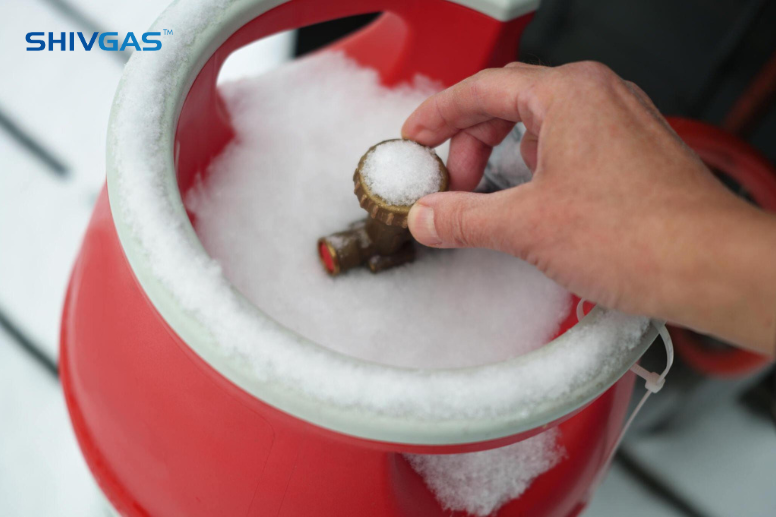
A widely used source for energy, LPG is known for both its efficiency and versatility. Renowned due to its precise temperature control, LPG supplies heat evenly and immediately for all industrial and household purposes better than petrol or any other fuel oil. However, despite being an unadulterated fuel that has no scope for spilling, contamination or metal loss, there are concerns when the temperature drops below its freezing point.
As the temperature drops, propane contacts and the colder ambient weather slows down the flow. This fluctuating rate of pressure can cause your tank to freeze up. Not only that but when you are using your cylinder extensively, the rate of vaporization is often not sufficient in comparison to the rate of conversion (from liquid to gas). This can lead to the formation of ice on the surface of the cylinder. This is called gas cylinder sweating which in extreme cases can not just cause water droplets but also ice to form.
This phase change from liquid to solid can make it completely unusable for the intended purposes. The decrease in pressure within the cylinder that causes the gas to reach its freezing point can result in solidification and potentially cause blockages within the cylinder.
Plenty of factors can cause LPG to freeze. Ambient temperature fluctuations, improper storage conditions, impurities within the gas, improper design of the cylinder can all result in solidification and disturb the flow of the gas in the pipelines
Gas cylinder sweating is not a safety hazard, but here’s a few tips on what to do:
Now, wrap your head around what you should be avoiding:
Shivgas is a premium gas agency that has been leading the domestic, industrial and commercial sectors for the past 30 years, providing innovative solutions with cutting-edge technologies and unmatched services. With utmost commitment to quality and reliability, we have developed innovative solutions to combat freezing issues effectively.
By adding additives and proprietary technologies, Shivgas has strengthened the LPG’s resilience to extreme weather conditions and extensive usage, thereby ensuring continuous and reliable performance. The inclusion of such additives and proprietary technologies has allowed us to create LPG blends that are suited to avoiding solidification and the formation of ice crystals on the outer surface of the cylinder.
Our gas cylinders are comprehensively insulated and tailored to incorporate advanced temperature monitoring systems, thereby, making sure to equip you with optimum outputs even during harsh weather conditions and long periods of continuous usage. Prioritizing customer education and support, we are the standout gas agency to offer precise guidance on handling, storage and usage practices.
By aiming to minimize the likelihood of freezing incidents through proactive maintenance and adherence to industry best practices, our seamless solutions are now recognized all across India as the most trustworthy, optimum and efficient.
Solidification and formation of ice is a significant challenge for users across all sectors., thus, causing the need for agencies to come up with solutions that are both efficient and cost-effective. Delivering always on time, maintaining appropriate quality, and sticking to our promises, we are now not only gas agency that assures you of completely uninterrupted gas supply in compliance with not just national and international safety standards, but also your unique contemporary demands.
Comment (0)